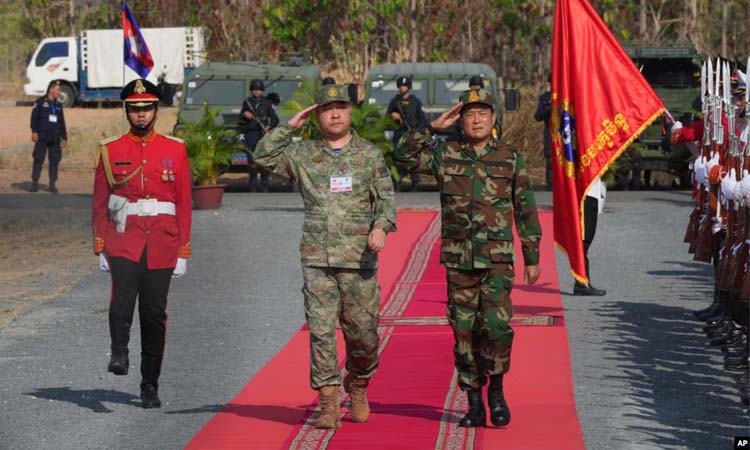China’s joint military drills with Mongolia and Cambodia in recent weeks have raised serious concerns about Beijing’s increasing strategic ambitions. These exercises serve as a potent tool for China to expand its influence in the global landscape. Known for setting a record number of joint military exercises in South East Asia last year, China has been holding joint military exercises big or small irrespective the size of country. In Cambodia, holding joint military drill is an annual affair but China’s involvement in upgrading the Ream Naval Base, including building a new pier, has raised suspicion over Beijing’s intentions. The presence of Chinese warships at the base for over five months fuels fears of a potential Chinese naval outpost in the Gulf of Thailand, a strategically vital region.
In Mongolia, “Steppe Partner-2024” was the first joint training between the two armies. For the maiden training, China deputed battalion-sized troops with various types of weapons and wheeled equipment. This move signifies China’s interest in expanding its military footprint in Mongolia, a country traditionally wary of aligning too closely with any major power. The Chinese state-run media, Global Times, justified the exercise as a countermeasure to the United States’ diplomatic actions in the Asia-Pacific region. This rationale, however, masks Beijing’s broader strategic objectives.
China’s Strategic ManeuveringChina’s military exercises with Mongolia and Cambodia are part of a larger strategy to enhance its influence and counter the United States’ presence in Asia. By engaging in these drills, China wants to build a network of military partnerships that can serve as a counterbalance to U.S. alliances in the region.
Under President Xi Jinping, military diplomacy has surged, reflecting China’s ambition to assert itself as a global power. The latest example is Cambodia where China’s investments have gone beyond military projects. Beijing has funded numerous infrastructure developments, including airports, roads, and private ventures such as hotels and casinos. With over 40% of Cambodia’s $10 billion foreign debt owed to China, Beijing wields significant economic leverage. This economic influence complements China’s military presence, creating a comprehensive strategy to embed itself in Cambodia’s political and security landscape.
Mongolia has historically maintained a neutral stance and avoided entanglement in great power conflicts. The “Steppe Partner-2024” exercise which focused on non-traditional security threats like illegal armed groups, was part of China’s attempt to engage Mongolia without pushing it into a confrontational alliance. However, the underlying aim remained the same: to draw Mongolia closer and reduce its susceptibility to US influence.
Experts said that China’s official narrative has tried to portray military exercises as part of efforts to promote regional stability and strengthen bilateral ties. The Global Times argued that the drills with Mongolia were necessary to counteract U.S. provocations, citing the Washington Declaration and trilateral exercises by the U.S., Japan, and South Korea. Describing its actions as defensive, Beijing said that they were aimed at safeguarding regional security and countering the U.S.’s “Cold War mindset.”
Observers are none too convinced. The strategic implications of China’s military activities are clear: Beijing was leveraging military diplomacy to enhance its operational capabilities and geopolitical influence. The modernization of China’s armed forces, combined with frequent joint exercises, boosted the PLA’s readiness and interoperability with other militaries. This not only served China’s immediate security interests but also aligned with its long-term goal of becoming a dominant global military power.
Background: a pattern of Military EngagementChina’s pattern of military engagement was not recent activity. Since its first known bilateral military exercise with Kyrgyzstan in 2002, China has steadily increased the frequency and complexity of its joint drills. From 2013 to 2018, China had conducted 44 military exercises on an average per year, a more than seven-fold increase from the previous decade. These activities ranged from bilateral air force exercises with Pakistan to multilateral naval and counterterrorism drills with Russia.
China has always considered foreign naval ports an important part of military diplomacy. These visits enable Chinese naval vessels to conduct maintenance, engage in diplomatic exchanges and participate in humanitarian operations at foreign ports. Such activities not only showcase China’s naval capabilities but also strengthen its diplomatic ties with host countries. By deepening military ties and leveraging economic influence, China aims to assert itself as a dominant power in Asia and beyond.
The global community needs to remain wary of China’s intentions, recognizing the dual-edged nature of its military diplomacy. As China continued to modernize its armed forces and expand its global presence, the international order faces a new challenge. Understanding China’s hidden designs behind its joint military drills is crucial for navigating the complex geopolitics of the 21st century.
Pen & Ink by: A R M Deluar Hossain (Journalist)
dailyasianage.com

